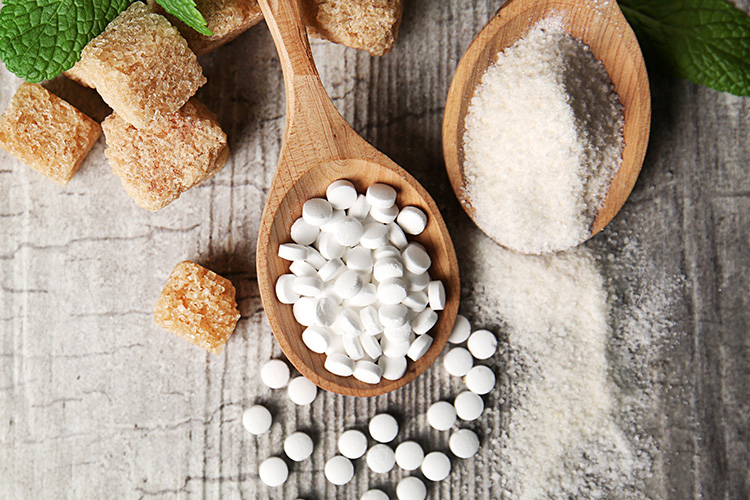Blog
Artificial sweeteners as bad as sugar
 Excess refined sugar = excess useless calories. That fact has become quite apparent! So, when a zero calorie alternative is invited into the sweet-satiating fray, problem is solved. Right?
Excess refined sugar = excess useless calories. That fact has become quite apparent! So, when a zero calorie alternative is invited into the sweet-satiating fray, problem is solved. Right?
Maybe not.
Energy value aside, the no-calorie-sugar-substitutes can be considered useless in the same way refined sugar is, in that they are devoid of beneficial nutrients. And what is more, we are unsure of the long-term consequences of chronic consumption of some artificial sweeteners.
Sugar substitutes have been linked with a variety of issues, including weight, brain function and possibly cancer. And research is still in relatively early days.
We have discussed the relationship between fake sweeteners and alterations of the gut flora populations – in animal studies.3 The question is, can we translate such findings to the human population?
The human microbiome, glucose tolerance, and artificial sweeteners
Research just released1 observed impact of artificial sweeteners on glucose tolerance and weight in humans – a whole lot of them.
2856 individual American diets were analysed for sugars and artificial sweetener consumption, in relation to body mass index, glucose tolerance, insulin resistance and fasting glucose.
Due to the strong correlation between type 2 diabetes and obesity (over 90% of those in the U.S. with type 2 diabetes are overweight or obese),2 the researchers wanted to nut out possible relationships between sugar and sugar substitutes consumption with both BMI and markers for type 2 diabetes.
Hmm. Why are we looking into artificial sweetener consumption and the risk of type 2 diabetes, you may ask? Well! Sugar substitutes are recommended to those with insulin resistance and overweight.
The results
Several sweeteners were put to the test, including the natural – sucrose, fructose; and the not-so-natural – aspartame and saccharin.
The results for aspartame were not good.
This man-made substance showed strong links to increased BMI, fasting glucose levels, and glucose intolerance.
Sure, the overall caloric intake is cut, which has proven useful in some studies for assisting lowering overall energy intake (and therefore contributing to weight loss). But this study suggested that aspartame may increase risk for type 2 diabetes, especially in those with higher adiposity.
And old mate saccharin – don’t think you have gotten off scot-free! Whilst the association wasn’t as strong, blood glucose levels after 2 hours were higher in obese individuals with glucose intolerance, compared to those with the same parameters but did not consume saccharin.
The primary concern with artificial sweeteners studied is they seem to have the biggest impact on the overweight individuals – those very people who are encouraged to reduce energy intake, and are at greater risk of glucose intolerance and developing type 2 diabetes,.
The question is, how?
Well, it may be down to the alteration of gut flora populations, and their influence on weight.
Interestingly, at the same time natural sugar consumption (i.e. sucrose) may contribute to similar outcomes, but through excess energy intake – it seems we cannot win!
So what do we take from this?
Whether the negative effects of sweeteners such as aspartame are outweighed by potential positive weight loss results is yet to be determined.
But do we want to wait to find out?
Deep down we understand that food made in a lab may not be the best choice. Nature is complex, and we humans have only scratched the surface in attempts to replicate what is naturally provided for us.
As opposed to replacing one sweet tasting thing with another, ideally we should be working toward:
- Reducing desire for sweetness
- Increasing sensitivity to sweetness.
Have you ever considered that what you might desire from chocolate is the fat content? And sugar may be a by-product with annoyingly addictive qualities.
Yes, we are programmed to want and enjoy sweet stuff. We aren’t saying let’s wipeout all sweetness from our lives altogether! But by finding satisfaction from healthy whole fats, protein and complex carbohydrates, overtime we may just crave the cookie, cake and Coke less and less.
By Angela Johnson.
References:
- Kuk, JL & Brown, RE 2016, ‘Aspartame intake is associated with greater glucose intolerance in individuals with obesity’,Applied Physiology, Nutrition, and Metabolism, [Epub ahead of print]
- Saydah, S, Bullard, KM, Cheng, Y, Ali, MK, Gregg, EW, Geiss, L, & Imperatore, G 2014, ‘Trends in cardiovascular disease risk factors by obesity level in adults in the United States, NHANES 1999-2010’, Obesity (Silver Spring, Md.), vol. 22, no. 8, pp. 1888-1895.
- Suez, J, Korem, T, Zeevi, D, Zilberman-Schapira, G, Thaiss, CA, Maza, O, Israeli, D, Zmora, N, Gilad, S, Weinberger, A, Kuperman, Y, Harmelin, A, Kolodkin-Gal, I, Shapiro, H, Halpern, Z, Segal, E, & Elinav, E 2014, ‘Artificial sweeteners induce glucose intolerance by altering the gut microbiota’, Nature, no. 7521, p. 181.











